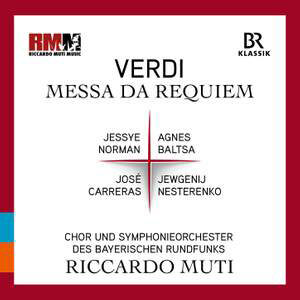How is it possible that this 40-year-old performance got by me? With the great Riccardo Muti, three of my favorite singers (at the time), and the fine Munich forces, it has greatness written all over it. There is a weight to this performance, a drama, a theatrical cast, that belies its occasional very brisk tempos. There are, I believe, four extant versions of this work led by Muti: among them, the 1979 is not good; the most recent one, with the Chicago Symphony Orchestra, save for the soprano soloist, is marvelous.
This performance brings to mind the one with the CSO. I wrote about that one for Classicstoday.com (you can read it here), saying that it had “a certain driven quality to the wilder moments–the Dies irae, the Sanctus–but elsewhere…a tenderness that defines the word ‘cantabile’.” I also mentioned the “marvelous contrasts”, and how “the very quiet (but still audible) beginning sets the mystical tone, but the word ‘Kyrie’ opens into more passionate prayer, as it should.” In my notes for this 1981 performance, I find almost the same words. I’ll add that the brass is truly reminiscent of what we may imagine the Last Judgement will sound like, and the timpani blows are huge and terrifying.
The work’s ultra-quiet opening is so soft it’s like an almost un-noticeable pillow of sound, and I was concerned that the whole recording might suffer from Karajan-itis, i.e: quiet passages needing to be turned up so high that when the triple-fortes come you’re blasted out of the room. In fact, that’s not the case: the recording is wide open and bathed in a warm acoustic that still allows for the trilled brass and winds to dazzle, while maintaining that velvet sound in soft passages.
Muti is the closest we have to a Toscanini-like drill-sergeant, and in a work like this, it’s very welcome. We hear fortissimos that are drawn back to pianissimos in the twinkling of an eye, so that you have to sit up and listen to the text; a “Dies irae” that is almost crazy were it not so hideously well controlled; a “Lacrimosa” that is filled with the encumbrance of sadness; a “Mors stupebit” out of Tales from the Crypt; a “Quam olim Abrahae” whose repetitive, falling lines welcome the offspring of Abraham–a joyous thing; a hypnotic “Hostias” that shimmers. And the terrifying opening and resolution of peace in the “Libera me”.
Jessye Norman, in later years to move to the mezzo part of the Requiem under Claudio Abbado, is sensational. The voice is at its early best–plush, easily produced, smooth yet urgently used in the work’s highly dramatic moments. Blending handsomely in the “Recordare” with the mezzo of Agnes Baltsa, whose potent, expressive low register is a stunner, Norman’s “Libera me” is on a par with Leontyne Price’s and Zinka Milanov’s, with perhaps even more anxiety in the opening words of deliverance and an equal amount of simply ravishing singing up to and including the soft B-flat near the end and the roof-raising fortissimo C a few measures later. Tenor José Carreras’ plangent sound was apt for this music, his smooth delivery, hushed singing in the “Hostias”, and fine delivery of “Ingemisco” being marred only by an unfortunate beat when he sings forte above the staff. Yevgeny Nesterenko more than holds up the quartet’s bottom: “Confutatis” is a grand statement.
And there you have it. We seem to have waited 40 years to hear this live performance on CD, but it surpasses all but maybe three of the more than 75 available performances. The recording is vibrant–maybe too much so for some, ideal for me–and if there is any criticism of it, it’s that Baltsa’s voice gets lost occasionally. This has been released to celebrate Muti’s 80th birthday–and what an achievement it is!
































